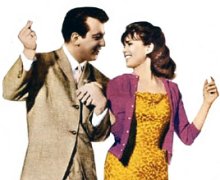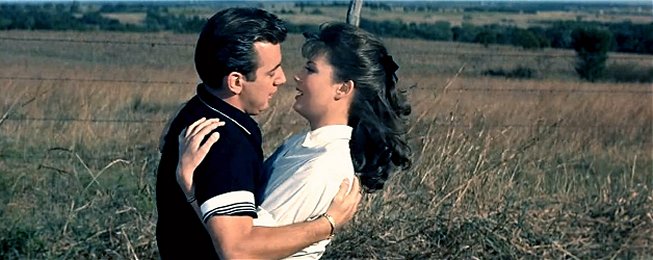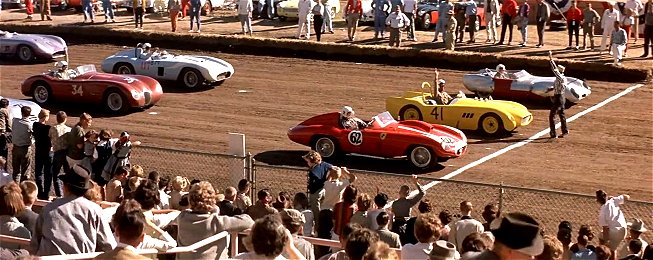

 |
 |
|
 |
State
Fair is a 1962 American musical film, a remake of the 1933 film State Fair
and the 1945 film State Fair. It
was shot during September and October 1961 at the Texas State Fair Grounds
and Oklahama City State Fair Raceway where the speedway sequence was shot.
Released in the United States on March 9th 1962, it had a budget of $4.5 million and grossed $3.5 million at the box office and wasn’t considered a successful musical with comments such as key people being miscast and the film being too cheesy and not working in the same way as The Sound of Music did 3 years later. It is the only Rodgers and Hammerstein musical written for film. While the 1933 and 1945 versions were set at the Iowa State Fair, the 1962 version was set in Texas. It would be further dramatised with the first stage musical being produced in 1969, using a variety of Rodgers and Hammerstein songs (many originally written for projects not related to the State Fair film), a non-musical version of State Fair that was filmed for television in 1976 and a revised version of the musical that appeared on Broadway in the 1990s. Rodgers and Hammerstein had originally adapted the Phil Stong novel of the same name for the 1945 movie musical. The re-make was announced in January 1960 by Twentieth Century Fox production head Buddy Adler, with Rodgers and Hammerstein commissioned to write new songs for it. However, Richard Rodgers' collaborator Oscar Hammerstein II died in August 1960 so Rodgers decided to write the lyrics himself. Charles Brackett was named producer and Jose Ferrer, who had just made 'Return to Peyton Place' for Fox, was named as director. This film was Fox’s 3rd version. Adler wanted the film ready by Christmas that year, saying it wouldn’t be a musical but “it will have plenty of songs by Rodgers and Hammerstein”. Unfortunately production had to be delayed as Adler died in July 1960 and Hammerstein dying a month later. Brackett described story as "... a beautiful property. It's a story about people with simple projects with which the audience can get really involved – the man who wants his boy to get a prize, the woman interested in her mincemeat, the girl who wants adventure and finds a fast young man at the fair". |
| The
story is centred around the Frake family (father Abel Frake, mother Melissa
Frake, young adult son Wayne Frake and eighteen year old daughter Margy
Frake), a farming family from Banning, Texas, getting ready to go to the
annual Texas State Fair in Dallas. Mr Frake has prepared his prize boar,
Blue Boy, to win the best state boar competition, but runs into problems
when his potential prize winner is mysteriously lethargic. Mrs Frake has
her own problems when, entering mincemeat and pickles hoping to stop a well
known rival from walking off with all the prizes, discovers even more competition
as commercial producers have entered several of the food competitions, including
mincemeat, this year.
Wayne is entering his red sportster in the Gold Cup car races against his arch rival Red Hoertert. Oblivious to the fact that his 'fiancee' Betty Jean has not come to the fair, he soon forgets about her when he meets Emily Porter, a performer and model who travels the fair circuit. She admits to Wayne that there have been a long line of men previously, but none have been him, for who she is also falling. Margy is just occupied with the thought of being in a relationship with a 'real man' instead of her rather boorish current partner Harry Ware and rather forgets all about him when she meets Jerry Dundee, an on-camera personality covering various aspects of the fair. Jerry is somewhat less forthright than Emily in saying that he too has had his fair share of women, however none were quite as trusting as Margy. Will the Frake children's romances extend past the end of the fair, with Emily being on her way to the next fair, and Jerry looking for a more lucrative job with some national scope? Emily Porter, the female lead, was given to Ann-Margret who was already under contract to 20th Century Fox and for this she was paid just $500 per week under the terms of her contract with Fox. This was her first feature film, although she was credited with ‘Pocketful of Miracles’ (while on loan to Paramount 1961) as being her debut because it was released before State Fair. Alice Faye came out of retirement to play Mrs Frake and Mr Frake was played by Tom Ewell, although Alice had wanted Don Ameche for this role. Also in the film were Pat Boone as Wayne Frake, Bobby Darin as Jerry Dundee and Pamela Tiffin as Margy Frake. |
 |
|
All
original material is copyright
Other copyrights may also apply from images or material owners. |